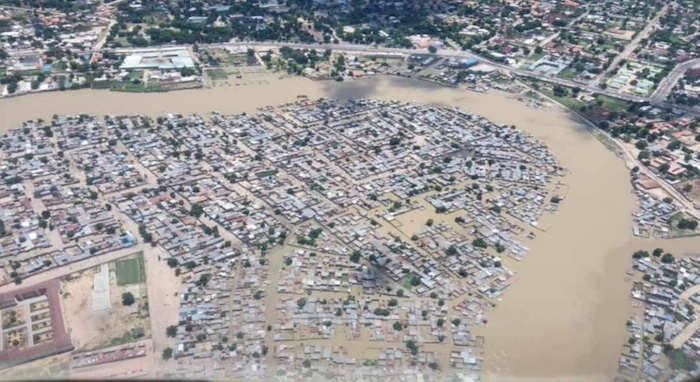Health Reporters Editorial
An early Tuesday flood in Maiduguri, the largest city in northeast Nigeria, has caused damage which has exacerbated the already existing humanitarian crisis in the state.
The tragedy, caused by the overflow of the Alau Dam, has submerged significant portions of Maiduguri, including key infrastructures and several residential areas, displacing thousands of people and causing untold hardship.
The flooding has further strained the already fragile healthcare system in Borno state, as a result of over 10 years of insurgency, raising concern over a rise in waterborne diseases and other health issues.
The situation is dire, with over 2.8 million people in need of clean water and sanitation services.
The humanitarian crisis in Maiduguri is complex, with factors like the Boko Haram insurgency contributing to the shortage of healthcare providers and erosion of food security.
Although, the Federal Government of Nigeria, Borno State government and international humanitarian organizations are working to provide aid, but more support is needed to address the scale of the crisis.
The effects of flooding on healthcare and humanitarian crises are multifaceted. For instance, on healthcare, waterborne diseases as a result of contaminated water sources may lead to cholera, diarrhea, and typhoid fever outbreaks.
It would also disrupt healthcare services by affecting the facilities, equipment, and supplies.
There is risk of vector-borne diseases, as a result of stagnant water which breeds mosquitoes, leading to malaria, dengue fever, and other outbreaks.
There are also mental health concerns, where trauma, displacement, and loss of property may contribute to anxiety, depression, and Post-Traumatic Stress Disorder (PTSD).
Apart from the healthcare crisis, the flood may lead to humanitarian crisis like displacement. As the floods may force people to flee their homes, leading to overcrowding in temporary shelters and strain on the already scarce resources.
It may also lead to food insecurity as a result of crop damage, livestock loss, and disrupted supply chains, which could exacerbate hunger and malnutrition.
The flood will also result water scarcity by contaminating or destroying water sources which will leave communities without access to clean drinking water.
It will also affect shelter and infrastructure damage by destroying homes, roads, bridges, and critical infrastructure.
The flood will also increase the already economic hardship, by impacting livelihoods, leading to loss of income, poverty, and increased vulnerability.
In the context of Maiduguri, the flooding will compound the existing humanitarian crisis already caused by the Boko Haram insurgency, further straining the healthcare system and exacerbating the suffering of already vulnerable populations.
To mitigate the effect of the flooding Health Reporters calls for improving climate resilience, that is the ability to anticipate and prepare for climate shocks, like flooding.
At Health Reporters we believed that humanitarian impact of floods can be mitigated by helping communities implement preventative measures.
We call on the international community, the non-government organisations, National Emergency Management Agency (NEMA) and the Borno State Government to implement a flood warning system to help a community evacuate in time, while the construction of levees can reduce the risk of rivers or streams overflowing into nearby areas.
Others are; Giving cash to vulnerable groups in communities at risk of flooding is another important tool in improving climate resilience.
Receiving cash assistance ahead of a flood empowers people to protect their lives and livelihoods, which improves their food security, economic situation, and overall climate resilience.

